Biblical Brinciples for Business Professionals

Building a House - Biblical Principles for Business Professionals
1 Thessalonians 5:11 says, “Therefore encourage one another and build up one another, just as you also are doing.” The Apostle Paul uses the words “encourage” and “build up” — two very similar words, but with some differences. The first word Paul uses means “to call to one’s side” in the Greek. It means to admonish and comfort one another.
The writer of Hebrews instructs believers to never give up meeting together, but to be “encouraging one another.” He speaks of the importance of being around other believers so that all can receive encouragement.
Building a House
The word Paul uses for “build up” when addressing the Thessalonians, literally means to “build a house.” The word is used by Jesus in his Sermon on the Mount when he talked about how the “wise man built his house on the rock.”
When someone is building a house, he starts with a firm foundation and frame, then continues to add more and more to the house, until it is complete. The walls, roof, insulation, plumbing, and electricity are added. Appliances and furniture are brought in until it becomes a nice, intimate place in which people inhabit.
We’ve discussed in previous podcasts/blogs the need to build relationships in the workplace. We also know from 1 Thessalonians 5:11 that we are to encourage/build-up others. One way we can establish meaningful relationships in the marketplace is to simply do what Scripture teaches us: build up one another.
In doing so, we must remember that such encouragement/building is ongoing. Paul acknowledges that the Thessalonians were already doing that very thing, so he encourages them to continue that action. After all, houses need maintenance and repair. People need continual encouragement.
The Emotional Bank Account
Many writers, preachers, coaches, and motivational speakers have taught about what is called “the emotional bank account.” When we make deposits into someone’s emotional bank account, we are saying/doing things for that person that establishes trust, among other things.
Stephen Covey says, when relating the concept to families, “Similar to a bank account, you can make deposits or withdrawals from each of your family relationships. Make a conscious effort to make meaningful deposits in your relationships.”
Of course, this applies to all facets of life, in all relationships, including the marketplace. If we are to make a difference in the workplace, it will be because we have built relationships with others. Therefore, we need to make regular deposits.
Here are just three examples of how you can make deposits in one’s emotional bank account:
* Empathize / listen actively to others
* Write someone a note of encouragement – “I noticed that you did a great job…”
* Say something nice about the person in front of others
More Than Just Keeping the Account “In the Black.”
Don’t just keep an emotional bank account in the black, but keep building. Keep making deposits. Obviously, a bank account with a large sum of money is better than one with a low balance; one that is in danger of going into the red.
By making consistent, even small deposits, the account grows steadily. Small deposits are very important and they are easy to make. When making small deposits into someone’s emotional bank account, they notice, especially if you make regular deposits.
Today’s Takeaway: Choose two or three people in your workplace setting in whom you will invest. In other words, set up two or three emotional bank accounts with two or three people — people you will encourage, build up. Commit yourself to making small, consistent deposits into those accounts. Encourage them; build them up so that they feel loved and appreciated.






 Visit Podcast Website
Visit Podcast Website RSS Podcast Feed
RSS Podcast Feed Subscribe
Subscribe
 Add to MyCast
Add to MyCast